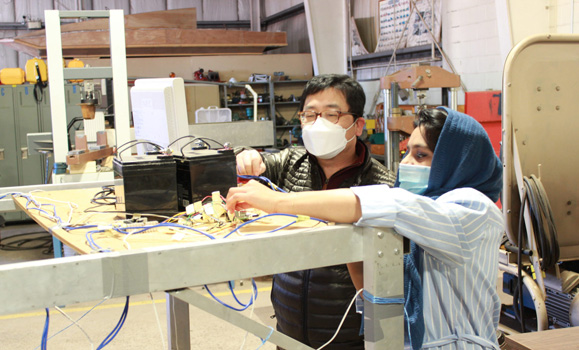Sabiha Antora started her master‚Äôs program with a big dream: to help the world produce more food. ¬Ý
As the global population continues to rise, the amount of food we produce falls alarmingly short. It's estimated that by 2050, there will be nearly 10 billion people to feed. That means we have 29 more growing seasons to figure it out.‚ÄØ
While the scale of this challenge is epic, Sabiha and her pioneering team that includes Dr. Young Ki Chang and Ryan Cobb want to be part of the solution.
Helping farmers with a health check-up for crops¬Ý
Growing up in the farming town of Teligati, Bangladesh, Sabiha saw first-hand how labour-intensive it was to manage crops.
“My grandfathers and uncles spent long days in the fields growing paddy and vegetables, like spinach, squash and bitter gourds,” she says.
“I wanted to develop something to take some stress off the farmers.”
Rather than relying on manual labour to scout out areas in the field in need of fertilizer or pest control, Sabiha and her team felt that a drone could do the job faster and better. ¬Ý
Using advancements in digital imaging and processing, Sabiha‚Äôs team proposed that a drone could be engineered to scan and process data in real-time. They wanted to develop a lighting-fast system that could analyse a field and prescribe steps for the farmer to take to maintain healthy crops. It would be like a health checkup for crops.¬Ý¬Ý
Applying to Dal Innovates’ Lab2Market
Working out of the robotics lab on Õ¯∫Ï∫⁄¡œ's Agricultural Campus, Sabiha, Young and Ryan, applied to Dal Innovates‚Äô Lab2Market program. ‚ÄúI had no idea about commercialization,‚Äù Sabiha says, ‚Äúbut I knew if we could help growers care for their crops quicker, we would be helping them to improve crop yields.‚Äù
A key part of the Lab2Market program is customer discovery. While Sabiha excelled at market research, her instructors saw that she was avoiding contacting future customers directly. “I was afraid growers wouldn’t understand me because of my accent, and that I wouldn’t find the right words,” she says.

To face her fears, Dal Innovates instructors Michael Carew and Permjot Valia suggested Sabiha start by contacting agriculture customers in Bangladesh. Of the Bangladeshi‚ÄØcontacts, she says: ‚ÄúThey gave me lots of ideas for how to relate to farmers in North America.‚Äù ¬Ý
Sabiha may have even landed a new job after contacting the Bangladesh Agriculture Research Institute.
“A senior scientist was so impressed by my dedication to developing digital agricultural systems that he offered me a research assistantship after I finish my master’s,” she says.
Pivoting from farmers to service providers
With new found confidence, Sabiha contacted farmers, CEOs of companies, agronomists and analysts. She and her team assumed their idea of a crop assessment drone would be embraced by farmers. However, it wasn’t long before she felt the sting of rejection.
‚ÄúThe feedback I got from farmers was negative,‚Äù she says. ‚ÄúThe farmers said things like ‚ÄòThat‚Äôs too expensive, I don‚Äôt need that, and I won‚Äôt be able to run a drone.‚Äô‚Äù¬Ý ¬Ý
Sabiha and her team had to shift their mindset. They had to redefine who would be interested in their technology. ‚ÄúI moved on to contacting service providers,‚Äù she says. ¬Ý
Through this outreach she learned several companies were already processing images, but it was taking them a week to deliver an inspection report on field conditions. These companies were focused on automation. They wanted to have field analysis in real-time because certain crop diseases can destroy a whole crop in a matter of days. “I now understood their pain,” she says.
How many acres of farmland can we analyse?
With a shared vision to help farmers produce more food, more sustainably at lower cost, Sabiha‚Äôs software aligns with the industry‚Äôs push toward automation. Equipment like self-driving tractors that work day and night is just the beginning. ¬Ý
While Sabiha received a warmer reception from industry service providers, they weren‚Äôt really interested in their team‚Äôs drone hardware applications, like how the scanners worked. ‚ÄúThe CEOs and company founders wanted to know about our system‚Äôs field level capabilities, like how large of an area can our system scan,‚Äù she explains.¬Ý
‚ÄúLab2Market allowed me to refocus my research,‚Äù says Sabiha. ‚ÄúI‚Äôm now back in the lab and more motivated than ever because I can see what the market needs.‚Äù ¬Ý
To stay a step ahead of the market, the research team is focused on designing software that pinpoints where a crop is under stress and delivers a prescriptive map in real-time. ‚ÄúHaving a prescription map frees up the grower‚Äôs time,‚Äù she says. ¬Ý
By caring for crops more quickly and precisely, she envisions farmers no longer needing to crop dust entire fields and instead, focusing on optimizing production.
Feeding the world starts with optimizing one field of potatoes
This summer, Sabiha and her team are planning to test their field assessment software. Commercial farmer Scott Newcombe is keen to get a crop checkup on his potato field. ‚ÄúWe‚Äôre hoping to scan his large field and compare the real-time processing of our data to our manual images,‚Äù she says. ‚ÄúWe will also provide Scott with a prescription map and a productivity estimate of what his crops will yield.‚Äù ¬Ý
Will this new field assessment software be integrated into tractors or drones? Sabiha‚Äôs not sure which is the better fit. That‚Äôs something for manufactures like John Deere or Kubota to decide. What she does know is that Lab2Market helped her understand the value of her crop assessment system and that she‚Äôs doing her part to help farmers get ready to feed the world.¬Ý

